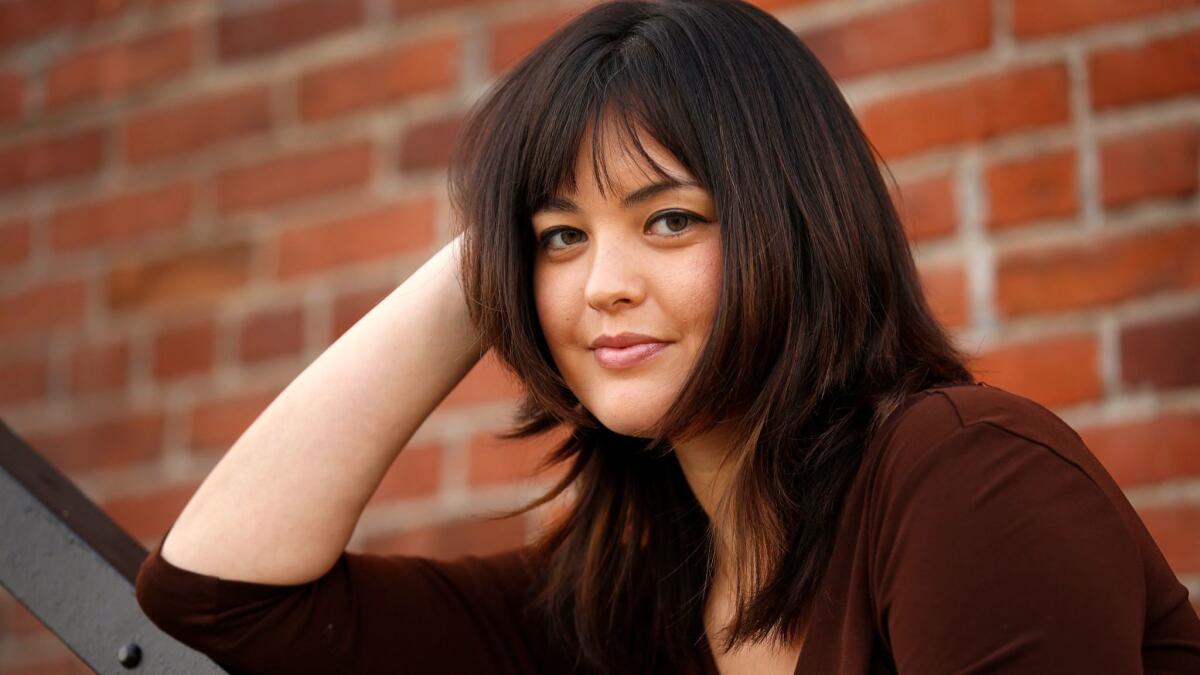Playwrights get a new stage: Audible announces 15 writers for audio theater project

Put the theater in your pocket. Or your purse. Or wherever you keep your phone or tablet.
That is the goal behind the latest move from audio book and podcast company Audible, which this week will announce its first round of commissions for playwrights — 15 emerging theater writers chosen by an advisory board of heavy hitters including Pulitzer Prize-winning playwright Lynn Nottage (“Sweat”), actress Annette Bening, Public Theater Artistic Director Oskar Eustis and playwright David Henry Hwang (“M. Butterfly”).
The writers, including Leah Nanako Winkler and Lauren Gunderson, were awarded grants to pen one- and two-person audio plays. The grants come from a $5 million fund set up by Audible.
Winkler received an email in August informing her of the commission, she said by phone from the Humana Festival of New American Plays in Louisville, Ky., where her play “God Said This” is premiering. “I was on the Metro-North [Railroad, in New York], and I just started bawling.”
Although the size of the commission has not been disclosed, Winkler said it’s large enough to “make a huge difference in a playwright’s salary.”
Money isn’t the only perk. Playwrights have been given full creative control, and they’re encouraged to stay involved when the plays are cast and recorded. They are also invited to work at Audible’s campus in Newark, N.J.
There are no restrictions, Winkler said, except the idea that they are writing “for the ears.” Winkler sees that as an opportunity rather than a drawback.
“This will all be in the audience’s imagination. It’s an exciting new way to tell a story,” she said. “It takes the craft beyond location and allows anyone with a smartphone or speakers to hear it where they are.”
Audible CEO Don Katz acknowledged that radio dramas have been around for nearly 100 years, but he emphasized that what Audible is creating is something different. It’s performative audio for the digital era, and Katz said the contributions of these playwrights could be transformative to industry’s landscape, which already includes established purveyors of recorded theater such as L.A. Theatre Works.
With the emerging playwrights fund, Katz wants to usher in a new golden age of audio drama using Audible’s reach and global subscription base.
“You are literally going to have your words inside the brains of millions of people driving to work. It’s completely private and intimate,” he said.
Katz, a former journalist and author, founded Audible in 1995, and the company was purchased for $300 million by Amazon in 2008. In 2012 it launched “The A-List Collection” featuring Hollywood stars such as Nicole Kidman, Colin Firth and Dustin Hoffman reading unabridged audio books.
Katz hopes the playwrights fund does for audio plays what “The A-List Collection” did for audio books: Shine a bright spotlight. That exposure, in turn, is meant to attract the best writers and performers in the business to participate — and garner large, diverse audiences.
Audible intends to stage live productions of these plays. Katz likes the idea of limited runs that will allow producers to recruit big-name actors. The theater business is highly dependent on ticket sales, so if overhead is high, producers often need a long run to recoup costs. But in the digital realm, those cost calculations are different.
“This really isn’t just a grant,” Katz says. “It’s a new business plan. What if we could become the electronic analogue to theater in a way that provides more support for fundamental creativity?”
Future Audible commissions will be announced on a rolling basis. Katz said he wants the grants to be more democratic, relying on an open-submission process in conjunction with input from an advisory board.
Winkler noted that Audible has made a concerted effort to be inclusive in its decision-making. Women and people of color account for 73% of the inaugural class.
“They really stuck to their mission,” Winkler said, recalling that when Audible first announced its intention to create an audio play fund, many lesser-known playwrights assumed commissions would be elusive. “It was like, ‘It’s going to go to Tony Kushner,’” she said.
The other playwrights to receive the first round of grants are Gunderson (“I and You”), Aaron Mark (“Empanada Loca”), Aditi Brennan Kapil (“Love Person”), Antoinette Nwandu (“Pass Over”), Bridgette A. Wimberly (“Saint Lucy’s Eyes”), Chisa Hutchinson (“She Like Girls”), David Rossmer (“The Other Josh Cohen”), Gary McNair (“Letters to Morrissey”), James Anthony Tyler (“Dolphins and Sharks”), James Fritz (“Four Minutes Twelve Seconds”), Madhuri Shekar (“In Love and Warcraft”), Nassim Soleimanpour (“White Rabbit Red Rabbit”), Paola Lazaro (“Tell Hector I Miss Him”) and Regina Taylor (“Oo-Bla-Dee”).
“When you meet these young playwrights, they are brilliant and talented and, frankly, underemployed,” Katz said.
Winkler won’t argue with that. She knows what it feels like to choose between eating and renting a rehearsal space to workshop a self-produced play.
“For any organization, especially one like Audible, which has so many resources, to say, ‘Use our office, go to our cafeteria, we want you to succeed, we want you to be comfortable,’ really does make our work feel valuable,” she said.
ALSO:
More to Read
The biggest entertainment stories
Get our big stories about Hollywood, film, television, music, arts, culture and more right in your inbox as soon as they publish.
You may occasionally receive promotional content from the Los Angeles Times.











